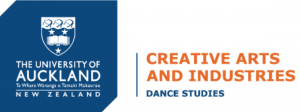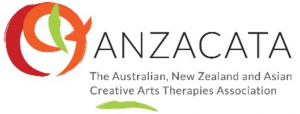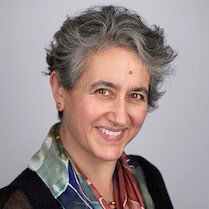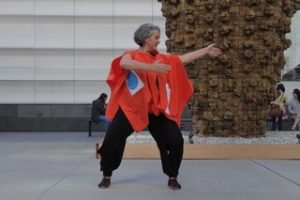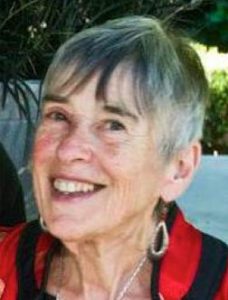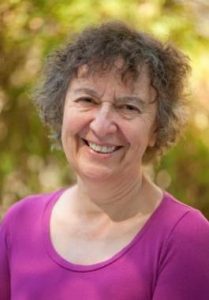DTAA Past Events
Past Research Forum Webinars
DTAA Members are able to access a list of past research forum webinar topics on the members only resources page here.
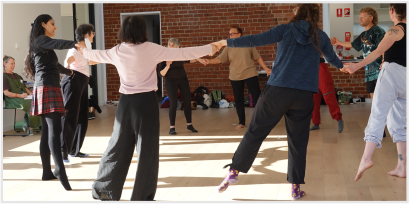 Sunday 7 April 2024
Sunday 7 April 2024
A psychomotor approach to expressive movement: as influenced by the work of Alfred Adler and Mary Wigman
Presenter: Nana Koch, Ed.D., LCAT, BC-DMT, NCC, LPC, LMA
Time: 9.30am-5.00pm AEST
Location: The Jack Dyer Community Room, Cnr Gleadell & Highett Streets, Richmond VIC 3121
Join Nana Koch in Melbourne as she presents a didactic and experiential workshop about the full expression of the individual.
Together, we will see what Adler’s concept of life force looks like in the body. We will identify blockages and tension patterns that prevent mobility and full expression, that affect body alignment and movement efficiency, we will explore movement sequences to free the body of tension and holding, and we will experience how improvisation helps unleash a full range of feelings and emotions in the body.
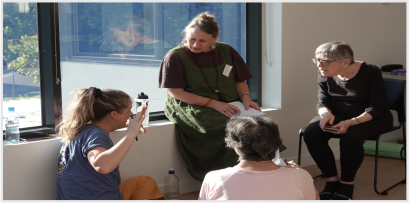 Saturday 6 April 2024
Saturday 6 April 2024
DMT Group Supervision with Nana Koch
Supervisor: Nana Koch, Ed.D., LCAT, BC-DMT, NCC, LPC, LMA
BOOKINGS OPENING SOON
Choice of 2 Sessions:
Session 1: Online Via Zoom, 1.00pm-.300pm AEST
Session 2: In Person.
Location: The Jack Dyer Community Room, Cnr Gleadell & Highett Streets, Richmond VIC 3121-3.30pm-5.30pm AEST
This event is open to registered DMT’s-you must be currently working with clients.
Nana Koch is offering clinical group supervision opportunities for registered DMTs, either in-person or online, while she is in Melbourne.
This is an opportunity you do not want to miss.
“Creating Community-Based Dance Performance in Rushcutters Bay”
2 Day in -Person Workshop
Saturday 11 November 2023 / 9.30am to 5.00pm AEDT
Sunday 12 November 2023 / 9.30an to 4.00pm AEDT

Presented by:
Marylee Hardenbergh, CMA, BC-D/MT, LICSW and Director, Global Site Performance
Learn how to incorporate Dance Movement Therapy concepts when creating a community-based dance performance – onsite, in Sydney’s beautiful Rushcutters Bay. During the 2-day workshop, we will work through the step-by-step process of investigating the site, creating the movement, planning the event, and presenting the performance. Community-based dance has a strange and wonderful way of stimulating rippling, healing effects on the community. Therapeutic aspects include such concepts as: inclusivity, expanded self and shared purpose.
“Therapeutic Aspects of The 3 Planes”
A FULL DAY online PD Workshop with Marylee Hardenbergh
Saturday 28 October 2023 / 11.00am to 6.00pm AEDT
Designed for DMTs, DMTs in Training, and Somatic and Movement Therapists

Rudolf Laban’s concepts of space and shape are the focus for this workshop, in which we will explore the use of the 3 planes and their meanings in our therapeutic work, through didactic and experiential material. We will then focus on the application of these concepts in the therapy session, when moving with groups and individuals.
Our facilitator, Marylee Hardenbergh, is a Certified Laban Movement Analyst, Board-Certified DMT, Clinical Social Worker and founding member and Founder/Artistic Director of Global Water Dances.
DTAA ANNUAL GENERAL MEETING 2023
Sunday 29 October 2023/ 1.00pm to 4.00pm AEDT
Online Via Zoom
DTAA Student Seminar 2023, Sunday 10 September 2023

The DTAA Workplace Development Committee warmly invites DTAA Student Members and DMT students to the DTAA Student Seminar 2023. This seminar informs DMT students of the work undertaken by the DTAA and its various committees, about the DTAA membership and registration process, clinical supervision requirements and more. The DTAA encourages students to join some of our committees and actively become involved in projects that will promote our profession and increase work opportunities for our members. The DTAA is dedicated to supporting students in all DMT training programs throughout Australasia; a Student Handbook is available to student members.
Date: Sunday 10th September 2023
Time: 1.00pm-2.00pm (AEST)/3.00pm-4.00pm (NZST)
Seminar will be by Zoom Meeting
Registration to the Seminar is FREE for DTAA Student Members
Sunday 23 April 2023
The Legacy of Marian Chace: how dance movement therapy group process and group development come together in the service of patient’s needs”
Presented by Dr. Nana Koch, International Presenter in Melbourne and offering a full day workshop.
Time: 9.45am to 5.00pm
Note: This workshop is in person and will not be recorded nor available via zoom.
Location: The Jack Dyer Community Room in Richmond’s Citizen Park, Cnr Gleadell & Highett Streets, Richmond VIC 3121
Nana will focus on the principals/goals of the Chace approach in leading dance movement therapy groups and how this approach provides an understanding of group structure and therapist facilitation within three session sections: warm-up, development and closure. The workshop would be of interest to Dance Movement Therapists (student and professional), creative arts therapists and therapists interested in running movement-based groups.
CPD: 6 CPD Points, Cat A
Saturday 5 November 2022 / Saturday 19 November 2022
2 Part Course, Online Via Zoom
“Healing Processes in Group Dance Movement Therapy: Eight experiences that lead to Therapeutic Change”
Led by: International Presenter, Nana Koch, Ed. D., BC-DMT, LCAT, NCC, LPC, CMA
Part 1: Saturday 5 November 2022 / 8.30am-1.00pm AEDT (Sydney Time)
Part 2: Saturday 19 November 2022 / 8.30am-1.00pm AEDT (Sydney Time)
This didactic and experiential course focuses on the eight (8) healing processes that have been identified as elements of group dance movement therapy. They describe “guided group experiences which lead to therapeutic change.” (Schmais, 1985) The eight processes include: synchrony, expression, rhythm, vitalization, integration, cohesion, education, symbolism. Suitable for practicing and student Dance Movement Therapists, somatic movement psychotherapists and those wishing to expand their knowledge of the healing processes that occur in group Dance Movement Therapy sessions.
Sunday 13 November 2022
Online Via Zoom
“Launch of the DTAA’s Student Handbook Webinar”
Led by: Mioi Forster-Nakayama/ Convener: DTAA Workplace Development Committee
Live Webinar, Via Zoom
Time: 1.00pm to 5.00pm AEDT (Melbourne, Australia)
DTAA and the Workplace Development Committee invites all DTAA Students, Trainees and Directors of Trainee Programs to attend the launch of DTAA’s Student Handbook. This handbook was developed to provide support to you during and after your training. At the launch some of DTAA’s practicing members will welcome you to the organisation through movement and discussion. Please come and be part of your professional community.
Date: Sunday 13 November 2022 / Time: 5.00pm (AEDT – 4.00pm (AEST) – 7.00pm (NZ)
Wednesday 23 November 2022
DTAA Research Forum: “Exploring the Relationships between Self-Efficacy, Dance Movement Therapy and High-Performance Environments”
Full Details Coming Soon – SAVE THE DATE
6.00pm-7.15pm (AEDT-Melb/Syd Time) | 8.00pm-9.15pm (NZ Time)
75 Minutes by Zoom
Members Only Event, Please log in to view full details
Friday 28 October 2022
Pre-AGM Event
“Working Safely with Trauma: The Body and Dance Movement Therapy”
A One Day Workshop with Dr Bonnie Meekums
Live Webinar, Via Zoom
Time: 7.30am to 3.00pm AEDT (Sydney Australia) | New Zealand 9.30am to 5.00pm NZDT (Auckland, NZ)
CPD Points: 7 Hours Cat A
This training workshop will include a brief introduction to the theory underpinning Bonnie’s approach (derived from her PhD research), together with experiential exploration of techniques for working with trauma through DMT. The concepts of the ‘dilemma of embodiment’, the importance of psychological safety and containment approach’ in DMP with traumatized people; will be covered. .Also, techniques of management will be taught to participants to allow the establishment of psychological safety. and DMT techniques that can be used for resolution of traumatic memories. This will include consideration of how this approach might influence participant’s practice. Although the focus is on client trauma, given the subject matter, participants need to ensure that they come prepared, with sufficient resilience and support outside of the workshop. Group boundaries including confidentiality will be agreed upon. It is not a workshop for personal therapy.
Saturday 29 October 2022
Pre-AGM CPD Event – AM Workshop
“Waranara: Seeking self, seeking connection with Indigenous culture through reflection and movement”
Presented by Sharon Carpenter
Live Webinar, Via Zoom
Time: 9.30am-12.30pm AEDT ( Melbourne Australia)
CPD Points: 3 Hours Cat A
Due to overwhelming demand, Sharon Carpenter returns with an extended version of her 2021 workshop around connection to Indigenous culture, recommended for practising and student body-focused therapists wishing to increase their cultural competency.
Choice of Tickets Available: FULL DAY (2 x 1/2 Day Sessions) / AM WORKSHOP / PM WORKSHOP
Saturday 29 October 2022
Pre-AGM CPD Event – PM Workshop
“Moving Culturally in Dance Movement Therapy: Understanding Diversity of Backgrounds, Body Language and Traditions”
Presented by Rewa Folwes with Jan McConnell, Sarah dos Santos and Ann Way

Live Webinar, Via Zoom
Time: 1.30pm-5.00pm AEDT ( Melbourne Australia)
CPD Points: 3.5 Hours Cat A
Working with people from different cultures can be a challenge from both the client and therapist point of view. Like words, movements and gestures have their own meanings and can be confusing and misunderstood. To assist in alleviating some of the stress experienced and to enhance movement multilanguage the presenters will be talking about their culture’s movement and dance style and giving us an experiential movement experience for us to think about what it means for DMT. The following presenters will give us a glimpse into their culture and how they use DMT in their practice and how their culture can enhance DMT. They are:
Rewa Fowles with Jan McDonnell- Māori / Sarah dos Santos – Brazil / Ann Way – Vietnam
Choice of Tickets Available: FULL DAY (2 x 1/2 Day Sessions) / AM WORKSHOP / PM WORKSHOP
Sunday 30 October 2022
“DTAA Annual General Meeting 2022”
Live Webinar, Via Zoom
Time: 1.00pm to 5.00pm AEDT (Melbourne, Australia)
All members are requested to advise of their attendance or non attendance for the DTAA Annual General Meeting 2022 minutes. Please click on the button below and complete the online form and SUBMIT to DTAA Administration by no later than Thursday 27 October 2022.
Wednesday 6 July 2022
DTAA Panel Talk 2: “Sharing Perspectives-Experiencing Dance Movement Therapy through an Online Setting”
6.00pm-8.00pm (Melb/Syd Time) | 8.00pm-10.00pm (NZ Time) | 9.00am (United Kingdom Time)
Presented by the Publications and Communication’s Committee
Hosted by: Jung-Hsu Jacquelyn Wan, with Guest Speakers: Verity Danbold and Ella Dumaresq
Saturday 25 June 2022 – Part 2
Professional Development Course over 2 Half Days – Live Online via Zoom
“Healing Processes in Group Dance Movement Therapy: Eight experiences that lead to Therapeutic Change”
Led by International Presenter: Nana Koch, Ed.D., BC-DMT,LCAT,NCC, LPC, CMA
Part 1: Saturday 4 June 2022 | 8.30am-1.00pm AEST (Melb/Syd Time) CLOSED
Part 2: Saturday 25 June 2022 | 8.30am-1.00pm AEST (Melb/Syd Time)
This didactic and experiential course focuses on the eight (8) healing processes that have been identified as elements of group dance movement therapy. They describe “guided group experiences which lead to therapeutic change.” (Schmais, 1985) The eight processes include: synchrony, expression, rhythm, vitalization, integration, cohesion, education, symbolism.
Wednesday, 16 March 2022, 6-8pm / Sydney, Australia Time / Live via Zoom
Hosted by the Publications and Communication’s Committee
In this two hour conversation, our host Anaia and two invited guests Jan and Juliette will share their journeys of being Dance Movement therapists in Australia and Aotearoa New Zealand. They will facilitate a friendly and interactive discussion to share strategies, processes, successes, failures, and lessons learned along the way when seeking work and engaging with public perceptions of DMT in Australasia.
BOOKINGS NOW CLOSED
Sunday, December 5, 2021, 3-6pm (AEDT), Live Zoom webinar
Presented by Judy Gantz and Deborah Heifetz
CPD points: 3 hrs Cat A
The MAP journey weaves Mental, Affective and Physical learning into an innovative model that offers a new and exciting perspective on human needs and trauma and integrates the principles of fascial movement. Suitable for practising and student Dance Movement Therapists, somatic psychotherapists, counsellors and psychotherapists wishing to expand their knowledge of the body and movement in trauma work. Do not miss this opportunity.
BOOKINGS NOW CLOSED
Friday 29 October 2021
The Phenomenal Body: Understanding and Applying Embodiment in Research-
A CPD Workshop presented by the DTAA.
This not-to-be missed half-day workshop is presented by Jennifer Frank Tantia, an expert in the field of embodiment in psychotherapy. Suitable for novice and seasoned researchers, graduate students and instructors exploring the fields of body and movement in counselling, psychotherapy and/or body focused therapies.
Friday 29 October 2021
9.00AM-12.00Noon (AEDT): Please check your time zone against the published start time. AEDT is Daylight Savings time in Sydney, Australia.
Presented by: Jennifer Frank Tantia
CPD Points: 3 Hours Cat A
FOR FULL EVENT DETAILS AND TO REGISTER, CLICK HERE!
Saturday 30 October 2021
Theory, Application and Indigenous Connection: Perspectives on the creative art of Dance Movement Therapy-
A Professional Development Day presented by DTAA!
Don’t miss the opportunity to enhance your theoretical and practical knowledge of Dance Movement Therapy (DMT). Suitable for practising and student DMTs, creative arts therapists and body-focused therapists. These three online workshops are presented by experts in their fields: Virginia Woods (neuroscience and somatic psychotherapy), Elizabeth Loughlin (play objects and vulnerable infants and their mothers) and Sharon Carpenter (indigenous connection and human qualities).
AM SESSION: Workshop 1 | 9.00AM-12.00PM (AEDT): Please check your time zone against the published start time. AEDT is Daylight Savings time in Sydney, Australia.
Dance Movement Therapy in clinical practice through the understanding of neuroscience and somatic psythotherapy
CPD Points: 3 Hours Cat A
Presented by: Virginia Woods
PM SESSION: Workshop 2 | 1.00PM-2.30PM (AEDT): Please check your time zone against the published start time. AEDT is Daylight Savings time in Sydney, Australia.
Aesthetic ‘sense’ in play objects for vulnerable infants and their mothers
CPD Points: 1.5 Hours Cat A
Presented by: Elizabeth Loughlin
PM SESSION: Workshop 3 | 3.00PM-5.00PM (AEDT): Please check your time zone against the published start time. AEDT is Daylight Savings time in Sydney, Australia.
Ngarra: Indigenous connection and our human qualities
CPD Points: 2 Hours Cat A
Presented by: Sharon Carpenter
FOR FULL EVENT WORKSHOP DETAILS AND TO REGISTER, CLICK HERE!
DTAA Annual General Meeting
Sunday 31 October 2021
12.00Noon – 5.00pm (AEDT)
Full details will be sent to all members in due course.
Embodying Culture Past, Present and Future: The moving body as a site of cultural reproduction, cultural encounter and cultural co-creation
Presented by Sara ‘Zora’ Boas – MCC, MA, RDMP –dance movement psychotherapist and practising artist who, in this workshop, will draw on anthropological theory, artistic practice, and coaching skills, to enrich and illuminate professional practice through a cultural awareness lens.
Session times:
2 Saturday Evenings.
Session 1 – Saturday 22 May 2021 | Session 2 – Saturday 29 May 2021
Time: 6.00pm to 9.00pm AEST Sydney Time
Download Brochure
DMT with children who have experienced childhood trauma” presented by Dr Bonnie Meekums, RDMP, Fellow ADMP
5 Hour ONLINE Workshop over 2 days:
Friday-16th April 2021/5-8pm AEST (Sydney) or 7-10pm NZST (Auckland)
Saturday 17 April 2021/6-8am AEST (Sydney), or 8-10am NZST (Auckland)
In this workshop you will learn about two applications of DMT with children who are at risk of trauma: DMT with groups of caregivers and young children (roughly aged 2-4); and individual DTM with primary school aged children (around 6 years old). Included in your workshop fee are two free case study articles to read in advance, and a movement observation tool which you will need to have with you for movement practice. You will be taught using a combination of video, discussion, and both observation and movement practice so that you can begin applying these tools in your own practice.
DTAA Annual General Meeting: Sunday 11 October 2020 1:15pm-5:00pm AEST
(3 hours CPD)
DTAA’s Annual General Meeting during which matters affecting the membership will be presented for questions and approval, as well as a celebration of our new members. Click Here to Download AGM 2020 Document Package
Saturday 10 October 2020 9:30am-12:30pm AEST
(3 hours CPD)
Workshop 1: Dance Movement Therapy Models and Measures
Three distinct population groups will be highlighted experientially in this workshop. The DM Therapists will present the models they use, with their personal influences on them, together with their assessment procedures. The chance to see how various DMTs organize their program delivery, whilst ensuring that their work is evidence based, will be provided.
Download Brochure
Saturday 10 October 2020 1:30pm-4:30pm AEST
(3 hours CPD)
Workshop 2: A Celebration of Dance – Indigenous Dance Practices and DMT
As the second half of our pre-AGM day, the DTAA is delighted to welcome you to a joyful afternoon of dancing with your fellow DTAA members, a rare opportunity to embody the dance practices of four diverse cultures: Indigenous Australian, Indigenous New Zealand or Maori, Japanese, and African.
Research Forum for September: DMT/ DMPT in times of Covid 19
Wed 30 Sep, 5:30-6:30pm AEST; 7:30-8:30pm NZT
Our friendly monthly discussion group of latest research relevant to DMT, this month addresses DMT/ DMPT in times of Covid 19. Hosted by Kim Dunphy, with discussant Brigitte Puls introducing three short articles. This free event is for DTAA members only: article, discussion questions and Zoom link here.
Spiralling Inward: Interoception as a Dance and Somatic Movement Therapy Practice and Process
An online workshop presented by Dr. Amber Gray
Sunday 27 September, 2020 – 9:30am to 12:30pm AEST
This 3-hour workshop will combine science, spirit and experiential processes to refine and enhance our interoceptive abilities, a radical act of micro-empowerment.
Full event details Download Brochure.
Cellular Breathing for Dance Movement Therapy: Sunday July 19, 5pm – 7pm AEST – With Tracey Nicholson
This workshop presents the fundamentals of working with the breath for Dance Movement Therapists and body-oriented counsellors and psychotherapists.
In these two hours, Tracey will introduce you to the concept of thoracic mobility, the role of breathing in core stability and anxiety states, and the practical application of cellular breathing in movement-based psychotherapy. Thomas Hanna’s awareness of breath is explored in the relationship of breath with pain, injury, movement, mental health and rehabilitation therapy*.
The workshop is suitable for any Dance Movement Therapist or body-oriented counsellor or psychotherapist looking to enhance their work with clients and to support their own personal well-being. By the end of the workshop, participants will:
• be more aware of their breath and its impact on body sensation;
• be able to identify breathing at a cellular level and the impact breathing has on a client’s daily function and potential;
• have more knowledge of how breath patterns contribute to neuromuscular and psychological encoding; and
• how anatomical knowledge of breathing enhances health and relaxation; together with
• knowledge of the healing potential of breath analysis in movement therapy.
Spots are strictly limited, book now to secure your place.
Download Flyer | Book through TryBooking.
Taking Your DMT Practice Online – Free Webinar for DTAA Members, Sunday April 26th, 6-8pm (AEST), 8-10pm NZ.
Recording coming soon
Taking dance movement therapy online is the topic for this Webinar organized by the DTAA for its members. This is an urgent issue for the many DMTs unable to conduct their normal face-to-face groups and client sessions due to the rapid spread of the Covid-19 virus and mandatory physical distancing regulations. Right now, it is not possible for DMT’s in Australasia to continue to practice in the typical way. There is an alternative, however, as we will show in this webinar. During the two-hour event, we aim to:
- support DTAA DMTs to understand how to modify or expand their practices, or aspects of them, to include online delivery;
- give DTAA members the confidence to set up online services for clients, should they choose to do so.
Prior to the outbreak of Covid-19, entrepreneurial DMTs in Australasia were already using online delivery with individuals, groups and /or for supervision and training. They have been successful, have experiences to share and have generously agreed to pass on their knowledge and encourage the rest of us.
CPD: 2 hours /points, Category A
Download agenda and information on presenters here.
Book in here to be sent the zoom log in details.
Making Connections Suicide Prevention Program (MCSPP) –
POSTPONED to May 2021 – Expressions of interest open.
Observe – Understand – Respect (OUR)
The Dance Movement Therapy Association of Australasia (DTAA) and The Creative Arts and Music Therapy Research Unit of Melbourne University (CAMTRU), are excited to welcome Associate Professor Susan Imus to Melbourne to give a two-day presentation and training that offers a unique approach to suicide prevention.
More information here.
Enquiries: Jane Guthrie 0451924015; Email: info@dtaa.org.au
Body Memory and the Unconscious – February 8, 2020, Auckland, NZ
Saturday, February 8th, 2020, 10am-5pm in Studio G10, Building 113 (Dance Studies), The University of Auckland
Presenter: Bonnie Meekums, PhD
Attention all qualified and student Dance Movement Therapists and Creative Arts Therapists, and those psychotherapists, counsellors and psychologists who are interested in Dance Movement Therapy.
This professional development workshop will address the ways in which our bodies remember feelings and events even when our conscious minds do not; these body memories may manifest in bodily symptoms, eating disorders, anxiety or injuries. They can be explored and worked through, using the principles of movement metaphor and the creative cycle, both inherent in the practice of Dance Movement Psychotherapy as articulated by Bonnie in her book Dance Movement Therapy: A creative psychotherapeutic approach.
The program includes movement improvisations in which participants will be invited to remember both positive and less positive experiences of themselves. Whilst they will be encouraged to work with only positive and mildly unpleasant memories, it is important that participants have sufficient resilience, and support outside of the workshop.
Learning objectives:
Participants will:
- Learn how to conduct a short client assessment to elicit positive body memories
- Understand the topic through consideration of case study material
- Explore their own experiences of body memory, through movement improvisation
- Consider how this approach might influence their own practice
Download Flyer here.
Book here.
This event is supported by the University of Auckland – Dance Studies and ANZACATA.
Nana Koch: Psychomotor Therapy and improvisational techniques around Liljan Espenak’s system of treatment – Feb 1 & 2 Melbourne
Nana Koch will be returning to Australia in February of 2020 to conduct this workshop at the Abbotsford Convent in Melbourne.
To ground this work in theory, and for those not present in last year’s workshop, there will initially be a review of the influences on this system, including the work of Mary Wigman, Alfred Adler and Alexander Lowen. The workshop will then follow-up last year’s introduction to Liljan’ Espenaks 3-part system for treatment: diagnosis, restructuring and integration. The course focus will be primarily on integration and the different ways pf stimulating the free expression of emotional content. Concentration will be on the use of improvisational techniques for unearthing our life force and vitality that include attention to, among others, images from everyday life, mask work and combined musical and movement choices that lead to emotional connections, expression and catharsis.
Download flyer here.
Book here.
AGM Professional Development Day – Saturday October 26, 9.30 – 5 pm, Darlinghurst NSW
Improving our employment possibilities through evidence-informed practice in dance movement therapy: what does it mean and how can we do it?
Presenters: Sue Mullane and Kim Dunphy with Suzanne Scarrold, Angela Kastanis and Clare Etherton.
Health and human service professionals are increasingly expected to use evidence to inform their work. This session addresses the topic of evidence and its implications for DM therapists. It focuses on the critical advances made when practice draws from existing information, and the potential for expanded employment opportunities when practice is underpinned by evidence. Participants will also be introduced to techniques in utilising published evidence, from searching for relevant publications to analysis of available information. The workshop will also involve movement experientials led by DTAA members working with diverse issues and populations through DMT, utilising DMT and related evidence. Finally, participants will be encouraged to consider how they can contribute to the expansion of evidence about DMT, utilising accessible assessment and evaluation tools.
Learning objectives
Participants will:
– advance their understanding of the concept of evidence-informed practice;
– improve their skills in searching for and utilising evidence to inform professional practice;
– enhance their capacity to create evidence by using appropriate assessment and evaluation tools in their practice.
DTAA 2019 AGM – Sunday October 27, 9:30am – 4.30 pm.
East Sydney Community and Arts Centre, 34-40 Burton St, (cnr Burton & Palmer Streets), Darlinghurst, NSW
This important event for the DMT profession in Australasia will involve a whole day of valuable information sharing, discussion and enjoyable movement experiences, as well as presentation of the Annual Report, awards and a ceremony to welcome new Professional and Provisional Members, followed by networking with drinks and nibbles. All members are warmly invited and encouraged to attend, either in person or by Zoom.
DTAA NDIS resources webinar – Monday 7 October 6-7 pm, AEST
With Tessa Hens and Kim Dunphy
The DTAA has come to the end of a project to develop a set of resources for DM therapists in Australia who wish to access NDIS funds. The project was first instigated by the NDIS Sub-Committee and then completed by member Tessa Hens working as a contractor for the DTAA.
In this members only workshop, Tess will introduce participants to all the materials she has developed and will share with members how they might use them to advance their employment options and capability.
The session has been recorded and uploaded to the website here so it can be used at any time in the future.
The Practice of Authentic Movement: A Two Day Immersion with Connor Kelly
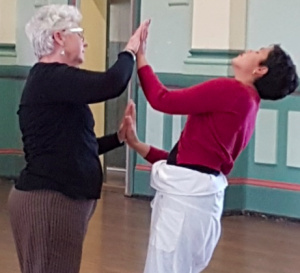 Saturday 7 and Sunday 8 September 2019
Saturday 7 and Sunday 8 September 2019
Dancehouse – 150 Princess St Carlton North VIC
The DTAA invites dance movement therapists, counsellors, psychotherapists, creative arts therapists, body workers, dancers, and those interested in exploring the use of movement and dance in their work to join us for this two-day immersion into the practice of Authentic Movement. This professional development workshop, facilitated by international presenter Connor Kelly, is suitable for practising and student therapists and practitioners.
On Saturday, Connor will facilitate two rounds of movement: working in dyads in the morning, triads in the afternoon and concluding with a breath circle. Sunday morning is dedicated to a Long Circle, while in the afternoon we’ll look at ways to integrate Authentic Movement into your work, and how you might introduce the practice to clients.
Download Flyer or book here.
Research Forum 16 Special Event Wednesday August 28, 6pm AEDT/AEST, 8pm NZT.
Forum 16: Special event, discussion on evidence informed practice (EIP) for DMT with Dr Kim Dunphy.
Please join us for a special Research Forum in August to hear about evidence informed practice (EIP) and what this means for DM therapists. On this evening, Dr Kim Dunphy will present on the current turn in psychotherapy from evidence-based practice to evidence informed practice. Members will then have an opportunity to discuss the draft EIP guide for the DTAA which will be presented at the upcoming AGM.
Liljan Espenak’s Psychomotor Therapy System – with Nana Koch
Saturday 12 and Sunday 13 January 2019
Edinburgh Gardens Community Room, Melbourne
Alfred Crescent, North Fitzroy, VIC 3068
The Dance Movement Therapy Association of Australasia (DTAA) is excited to welcome Nana Koch to Melbourne. Nana was closely mentored by Liljan Espanek – a pioneer of dance movement therapy in the USA – when she was a student, and is now a leader in her field in carrying Espanek’s legacies forward. Join us for this very special event, which is the first time this pioneer’s theories and philosophies, that were strongly influenced by Wigman, Adler and Lowen, have been presented in Australia in this capacity. In this workshop attention is paid to the ways in which Liljan used expressive dance and diagnostic movement tools to facilitate integration, the ideal body, and feelings of well-being. Adler and Lowen’s influence on Espenak’s work is discussed, along with concepts inherent in psychomotor therapy and its areas of application.
By acquainting participants with Espenak’s concepts of diagnosis, restructuring, and integration, they will learn how she used particular exercises to help patients express “the four emotions,” develop muscle-memory, and experience catharsis, all leading to behavioural change.
This two day workshop will be suitable for dance movement therapists, psychotherapists, psychologists and creative arts therapists.
For more information: download flyer or book here.
Body as Voice Training Part 3 – Amber Gray
Friday 14- Monday 17th December 2018
Emely Baker Centre, Edinburgh Gardens, Melbourne
Alfred Crescent, North Fitzroy, VIC 3068
The DTAA is pleased to welcome Amber Gray back to Australia for Part 3 of Body as Voice. Amber offers unique training in Restorative Movement Psychotherapy for survivors of trauma in a body, movement, and rhythm based framework.
Part 3 of Body as Voice will build on and continue work with the dyadic therapeutic relationship – integrating working with families, groups and communities. This group- focused module emphasises integration, wholism and restoration of a sense of belonging. Polyvagal informed DMT is elaborated, and based on the group composition, working with everything from group therapy to large-scale disaster and complex humanitarian emergency responses are optional topics. This class serves as an integration and closure for the cohort.
Body as Voice Part 1 and 2 are prerequisites for attending this workshop, please contact admin@dtaa.org.au if you think you may qualify for admission based on other experience.
For more information please download flyer or book here.
The practice of Authentic Movement: a two-day immersion – with Connor Kelly
Saturday 24 and Sunday 25 November 2018
Balmain Town Hall, Sydney
370 Darling St Balmain, Balmain NSW 2041
The Dance Movement Therapy Association of Australasia (DTAA) invites dance movement therapists, counsellors, psychotherapists, creative arts therapists, body workers, dancers, and those interested in exploring the use of movement and dance in their work to join us for this two-day immersion into the practice of Authentic Movement. This professional development workshop, facilitated by international presenter Connor Kelly, is suitable for practising and student therapists and practitioners.
On Saturday, Connor will facilitate two rounds of movement: working in dyads in the morning, triads in the afternoon and concluding with a breath circle.
Sunday morning is dedicated to a Long Circle, while in the afternoon we’ll look at ways to integrate Authentic Movement into your work, and how you might introduce the practice to clients.
For more information download flyer or book here.
Annual General Meeting and CPD Weekend,
Fri 26, Sat 27 and Sun 28 October, Edinburgh Gardens meeting room, Fitzroy, Melbourne and by Zoom
Friday 26 October: PD workshop Writing for Publication, Sue Mullane, 10.30-4.30 pm. Venue: Fitzroy (as above).
Saturday 27 October: Workshop with international guest presenter Jilba Wallace on ‘Using Neuroscience to explain what DM therapists do’ (as above).
Informal dinner, Empress Hotel, corner Nicholson and Scotchmer Sts, North Fitzroy.
Sunday 28 October: AGM meeting, discussions and presentations: 9.30 am to 4.30 pm.
Sunday will include: a movement warm-up; our formal AGM including elections for new leadership team; presentation of the final draft of Competencies for DMT Australasia; presentation of the new Constitution for the DTAA; presentation of the HEMF Annual Achievement Award; and ceremony acknowledging and formally welcoming our new Provisional and Professional Members for 2018. Detailed AGM 2017-2018 agenda
It’s a very important day for our profession where members have the opportunity to learn about and contribute to new developments. Please make your best effort to attend either in person or by Zoom from anywhere!
Zoom https://zoom.us/j/2313362028
or phone meeting ID: 2323362028 Australia 02 80152088
or NZ +64 04 831 8959
Neuroscience: Using new vocabulary to explain what we do – with Jilba Wallace
Sat. 27 October 9:30am – 5:00pm
Edinburgh Gardens & Community Centre
Alfred Crescent (off Brunswick St), Fitzroy North, Victoria 3068
CPD: 6 hours
This workshop is designed to help established dance therapists and/or students, to explain the vocabulary and advances in Neuroscience, and how they relate to current dance/movement therapy practice. This can help clients understand the mind/body connection better and become more open to the interventions the dance/movement therapist offers. Jilba will present some current neuroscience theories of trauma, movement and the body, and coach participants on how to use explanations as well as make appropriate interventions with clients in a private practice setting. Therapy models will include Christine Caldwell’s “The Moving Cycle”, Bessel Van der Kolk’s trauma work, Sensorimotor Psychotherapy and Dialectical Behaviour Therapy.
For more information download flyer or book here.
Writing for publication – with Sue Mullane – POSTPONED
Fri. 26 October 10:00am – 4:30pm
Bargoonga Nganjin, North Fitzroy Library, 182 St Georges Road, North Fitzroy.
CPD: 6 hours
This workshop offers participants the opportunity to know how to create and cultivate good writing practices useful for supporting professional life. It references the work of Helen Sword, NZ-based scholar, teacher and poet, who has published widely on shaping personal habits which more reliably lead to successful academic writing. The workshop will study some of these suggestions, as well as weave in creative writing techniques involving DMT tools such as use of breath, tuning into the body and connection to sensory awareness to stimulate immersion in language.
For more information: download flyer or book here.
Thinking Bodies: Moving Minds Symposium – A symposium on the Art of Embodiment
Melbourne, Abbotsford Convent
September 15 & 16, 8:30am – 5:30pm
1 St Heliers Street Abbotsford VIC
In somatics and dance movement therapy practices, embodiment is a core philosophical assumption, one that is so embedded in what we do that we may find it challenging to articulate or identify what we mean by the term. This symposium will offer a wide range of opportunities to investigate and reflect on meanings and experiences of embodiment, in order to share, deepen and enrich our somatic practices.
We invite you to be part of this inaugural Australian somatics symposium, joining leaders from the fields of somatics, dance and dance movement therapy, all of whom share a common interest in embodied practices. The historic Abbotsford Convent provides the perfect venue for this rich program of deeply experiential movement workshops, thoughtful presentations and discussion, reflection and professional development.
For more information please visit the symposium webpage or download flyer.
Research Forum Webinars
July webinar: Examining case study research, slides of presentation led by Prof. Sherry Goodill
Movement and Dance as a resource in therapy – expressing the body’s wisdom, presented by Virginia Woods
Sydney, Annandale Community Centre
June 30th – July 1st
79 Johnston St Annandale NSW
Join us for one or two days as we experience dance as a natural resource that supports release, expression and unfolding. These two workshops offer you an opportunity to explore authentic expression of the body’s wisdom. Discover how movement and dance move beyond the mind to support healing and the fulfilment of potential. The workshops are suitable for practising and student dance movement therapists, psychotherapists, creative arts therapists, wellness practitioners and those interested in exploring how dance can be used in therapy.
Day One – Expressing the body’s wisdom to free the heart
Drawing on the latest research in neuroscience and anthropology, you will explore experientially how movement and dance goes beyond words, to deepen and enhance therapy.
Day Two – Embodying the True Heart Self in dance
Deepen your experience of embodiment, exploring authentic movement and dance. Build your confidence and connect to “who you really are”.
Virginia Woods is a psychologist, dance-movement and creative arts therapist, and somatic psychotherapist (Hakomi trained). Virginia is an experienced therapist who confidently supports people to work through old patterns into being in their true experience of self.
For more information please
Download this flyer or
Book online here
Body as Voice: Restorative Movement Psychotherapy
A Training with international trauma expert Amber Gray
PART 2 – Melbourne April 20th – 23rd 2018
Friday 20th & Satruday 21st, Loughnan Hall, 57-65 Coppin Street, Richmond
Sunday 22nd & Monday 23rd, Edinburgh Gardens, Alfred Crescent, Fitzroy North
Please note you must have competed PART 1 to be eligible to participate in PART 2 of this valuable training.
Amber’s 3-part training is based on her 20 years experience as a Dance Movement Therapist and Somatic Psychotherapist specializing in interpersonal trauma, including torture treatment, refugee mental health, ritual abuse, childhood trauma and human rights violations, in cross cultural contexts. Of note, Part 1 and 2 are currently approved for ADTA Alternate Route (Graduate Level) Training, and Part 3 is in process.
Part 2, “Body as Voice: Body Wisdom”, will emphasize embodiment of resources with somatic and movement-based processing of trauma narratives, to support connection and meaning making and Part 3 “Body as Voice: The Collective Body”, builds on work with the dyadic therapeutic relationship, integrating working with families, groups and communities. It emphasizes integration, wholism and restoration of a sense of belonging.
Webinar available on-line:
DTAA’s first webinar featuring DM therapist Noa Belling on Mind-body Awareness: practical strategies is now available here.
Webinar: Mind-Body Awareness & Practical Strategies, with Noa Belling, Tuesday 6th March.
In this webinar Noa, author, somatic psychologist and dance movement therapist, shared her inspiration and some of the practical strategies offered in her new book, The Mindful Body: Build emotional strength and manage stress with body mindfulness.
A recording of the session is now available here.
Excerpt from Noa’s book: Exploring your mind-body connection; TV interview about Noa’s work here.
Event flyer: Noa Belling and DTAA webinar invite
This event qualified for 1 hour of DTAA CPD Category B.
In Australia, The Mindful Body is available through most bookstores, online through booktopia or directly from Rockpool Publishing in Sydney.
International Presenter Sara Boas in Sydney, February 10 & 11, 2018
When you listen to your body, what does it say? When you witness the movement of your therapy clients or fellow artists, what stories do they seem to tell? This two-day experiential workshop provides a deep experiential dive into your body of experience, develops your skills in facilitating others to share their stories in movement. The sessions are designed for both experienced dance movement therapists and those who may be new to the field, or working in associated professions of somatic practices, performing arts or movement education.
Founding Director of Boas Consulting, a pioneering enterprise that facilitates individual and collective transformation for transnational corporations, governments, NGOs and academic institutions in over 100 different countries, and formerly senior lecturer in the anthropology and sociology of dance at the Laban Centre of London, Sara is also a registered dance movement psychotherapist and practising artist. Sensing, moving, writing, witnessing and voicing, this workshop invites you to explore the depths of your own life experience and history and to practice holding space for storytelling of the body to unfold.
This event qualified for DTAA CPD 12 hours Category A.
Marylee Hardenbergh, Melbourne, January 20th- 21st 2018
Marylee Hardenbergh is a DMT and choreographer who loves to organise out door specific choreographies, she has done this for over thirty years. She is the Artistic Director of Global Site Performance and a founding member/original Artistic Director of Global Water Dances. She has received numerous awards and grants including fellowships for choreography from the National Endowment of the Arts in the USA and the Soros Foundation. She was honored to be Marian Chace lecturer at the American Dance Therapy Association conference in 2015. She’s been a practicing dance therapist for 40 years and has led many movement choirs. She trained under Irmgard Bartenieff and Penny Lewis Bernstein; she is also a Certified Movement Analyst and a Board-Certified DMT. She loves to use space harmony in her work, and brings in a therapeutic sensitivity to all of her choreography. In Hardenbergh’s workshop planned for Melbourne, she will discuss the therapeutic aspects of creating community-based Movement Choirs and performances. Working together with Melbourne dance and dance therapy communities, her weekend workshop will culminate in creating a site-specific event performed at a place chosen with the participants.
Amber Gray Workshop: Body as Voice, Restorative Movement Psychotherapy for Survivors of Trauma, December 2017
When: Dec 1st- Dec 4th 2017
Where: Northcote Townhall, 189 High St, Northcote, Victoria 3078
Part 1: Body mind, beginner’s mind of a 3 Part Workshop Series
Amber Gray is returning to Australia to offer her unique body, movement and rhythm-based framework for promoting resiliency and processing traumatic experience in clients who are survivors of traumatic life events. Restorative Movement Psychotherapy (RMP) is a components based framework that promotes embodied presence through structured somatic skills, and verbal and non-verbal processing, to support survivors’ restorative process. It has been cited in numerous peer reviewed and academic chapters, and has been taught in Australia, Haiti, Indonesia, Norway, Lebanon and the United States.
For more detail on the workshop, pricing and registration links please see this flyer: Amber Gray Workshop December 2
AGM and Professional Development Weekend, 20-22 October 2017
Join your fellow DTAA members for a weekend of professional development and connection. Hear about the latest developments of our subcommittees, including progress towards registration with NDIS. Contribute to discussions re-development of new competencies for DMT and welcome new Professional and Provisional Members.
Friday 20: Workshop: Kim Dunphy and Sue Mullane, Writing for Publication Venue: Bargoonga Nganjin, North Fitzroy Library, 182 St Georges Road, North Fitzroy).
Saturday 21: Workshop: Sandra Lauffenburger: Somatics, Effort/ Shape, Self psychotherapy and Supervision Foundations for DMT
Venue: Community Room, Edinburgh Gardens, Brunswick St, Fitzroy North. This workshop is only available for those who attend in person.
For more information please see this flyer: Flyer Sandra Lauffenburger Workshop 2017
To register go to: https://www.trybooking.com/RMQY or https://www.trybooking.com/307344
Dinner: Followed by networking dinner in local restaurant (to be advised) from 6 pm
Sunday 22: Annual General Meeting. 9.30- 4.30 pm
Venue: Community Room, Edinburgh Gardens, Brunswick St, Fitzroy North VIC 3068
Program: Early morning movement warm-up with Robyn Price (9.30-10.30); NDIS project panel and discussion (NDIS Sub-Committee)(10.45 – 11.45) and Professional Membership clinic with Sandra Lauffenburger (10.45 – 11.45), AGM and presentation of Annual Report (12.30-1.30), competency project discussions, definition and journal discussions (1.30-2.50 pm), book launch, HEMF Award and awarding of Provisional and Professional Memberships(3-4 pm), followed by drinks and nibbles (4-4.30 pm).
Writing a successful grant proposal: professional development workshop for dance movement therapists and other creative arts therapists with Dr Kim Dunphy
While dance movement and other creative arts therapists are highly skilled in considering clients’ needs and developing therapeutic programs to address those, they often struggle with finding ways to fund that work. This workshop helps address that problem by offering a practical and hands-on session in seeking out and writing successful grant applications.
This session offers participants the opportunity to develop a successful grant proposal. It includes skill development in finding a relevant grant opportunity, sharpening responses to selection criteria, providing relevant background and articulating the benefits of the proposed project for stakeholders from funders, to participants and the wider profession. Participants should come with a specific project or grant round in mind, and will spend the day working specifically on that task. Expect to complete the session with a proposal well-developed for submission!
Regional, interstate and overseas participants welcome:
Participants who are not able to attend in person are invited to participate in the workshop using free conferencing technology Zoom.
The session is especially developed to support applicants to the Hanny Exiner Me morial Foundation grants for DMT research which close on July 17.
morial Foundation grants for DMT research which close on July 17.
Date and time: Saturday May 27 9.30-4.30;
Venue: Fitzroy Library, Meeting room 1, 128 Moor St, Fitzroy VIC 3065
To Register: Go to – https://www.trybooking.com/PHUQ or https://www.trybooking.com/268908
For more information please view this flyer: 2017 Grant Proposal Writing with Dr Kim Dunphy Flyer
Another session later in the year will offer professional development in how to write for publication.
Photo: HEMF recipient Marita Jacobsson, with Nelinha Pereira and Kim Dunphy in 2014, in Timor-Leste undertaking her research project.
Presenter: Kim Dunphy has written successful grant proposals for hundreds of thousands of dollars to funding bodies in Australia and other countries, including local, state and federal governments, philanthropic organisations, private funders, universities, professional service organisations (including PACFA and UNESCO), and others. All of these have been for arts projects or research and many for dance movement therapy. She has also made successful proposals to HEMF and supported several other DM therapists to write them also. Kim’s most recent application was for a Mackenzie Post-Doctoral Fellowship at the University of Melbourne, where she is now Australasia’s first salaried DMT researcher.
Sara Boas Workshops in Sydney
The Dance-Movement Australasia (DTAA) is delighted to present two professional development-in-movement workshops facilitated by International dancer, healer, researcher and leadership coach Sara Boas. From Friday, May 5 to Sunday, May 7, 2017, Sara and the DTAA welcome DMTs, psychotherapists, arts therapists, wellness practitioners, coaches, consultants, dancers and other artists to join us at the historic Drill Hall dance space on the water’s edge at Sydney’s Darling Point for one, two or three days of movement-based exploration and learning.
Dates: Friday 5th – Sunday 7th May 2017
Venue: The Drill Hall, 1C New Beach Rd, Rushcutters Bay NSW, 2011
Friday: Transcultural Competence Workshop
Through an intensive experiential engagement, the workshop explores the real challenges and opportunities that we encounter in our work, whether or not our practice is explicitly ‘cross-cultural’. Participants are encouraged to question their own assumptions about culture, identity, ‘difference’ and more, and to develop new ideas and ways of working, all within a safe and supportive learning environment.
Saturday and Sunday: Art Making as Healing.
This two-day workshop focuses on the therapeutic value of creation and performance, as well as the artistic potential of therapeutic process. With a focus on dance and improvisational movement, but also incorporating poetry and drawing, the workshop combines experiential exploration with reflection, discussion, and theoretical analysis.
For anyone interested a supervision session can be arranged on the Saturday of the following weekend (May 13th, times TBC), please register your interest for this at admin@dtaa.org.au
To book please click on the following links to access Trybooking:
https://www.trybooking.com/PFHN or https://www.trybooking.com/267215
For further information on the workshops and Sara Boas please go to this flyer: SaraBoasFlyer2017
Laban Movement Analysis: Teasing out the essentials for Dance Movement Therapy and other movement practices.
When: Saturday 25th and Sunday 26th of Feburary 2017
Where: Balmain Town Hall, 370 Darling Street, Balmain, Sydney
A two day immersion in movement behaviours, observations and analysis
Jane Guthrie and Heather Hill combine to present a workshop that connects LMA theory with practical application in the field. In order to do so, they will draw on specific areas for the purposes of recording movement observations and analysis, program planning and development.
Over the two days, the workshop will cover:
- A “walk through” the main areas of the LMA framework, drawing on theory, embodied experience/practice and observational exercises which include practicing using the language of LMA.
- Presentation of how the framework has been applied to a population with dementia for observation, planning and evaluation. Drawing attention to the psychological and social aspects of LMA, and implications for planning therapeutic interventions with this group of people.
- Consideration of LMA application to other populations, through case studies from a wide range of areas, and small group discussion and presentation.
Throughout the workshop, there will be opportunities to engage with and embody the LMA theory, to practice observations, and to workshop applications to particular contexts. Participants are invited to bring in case material from their practice, or consider their own movement profiles and what might be important movement experiences.
Jane is a CMA as well as a DMT and physiotherapist. Her knowledge and experience from this background is linked with Heather’s approach as a specialist in the area of Dementia and person centred care. Their approaches to using LMA complement each other but come from differing perspectives. Heather is a DMT who has worked for 30 years with older adults and people with dementia.
To register please follow these links to Trybooking: https://www.trybooking.com/MZMI or https://www.trybooking.com/228132
For inquiries contact: admin@dtaa.org.au, Robyn Price (NSW contact) 0412585568 or Jane Guthrie, (03)95924017
To see more information about the workshop please see our flyer: LMASydneyWSFlyer
DTAA Supervision session
Date and Time:
Sunday November 27th, times TBC
Venue:
The Stables, 19 Duke Street, Richmond
Cost:
Members: $65.00, Member Concession: $55.00
Non Members: $120.00 Non Member Concession: $100.00
Take this opportunity to build up supervision hours and be involved in sharing with your peers.
A professional membership clinic will be conducted across the lunchtime break from 1.0 – 2.00 pm. There is no charge for this. It provides a great opportunity for increasing needed supervision hours.
Participants should have an issue or issues in mind that they are prepared to discuss and reflect upon.
Please register for this event by emailing admin@dtaa.org.au. We will provide EFT details on registration. The running of this event is dependent on attendee numbers so to ensure it goes ahead please ensure you register ASAP.
Annual General Meeting and Supervision Events
Sat 26 and Sun 27 November, 2016
ANNUAL GENERAL MEETING
Sun 27 November, The Stables, 19 Duke Street, Richmond
1.30-2.30 pm Informal shared lunch and Professional Membership Clinic
2.45 pm- 4 pm: The AGM will include a presentation of the usual report of activities and financials for the 14-15 financial year. Draft documents will be presented for discussion about several important topics followed by presentations of new Professional Memberships and the HEMF Award for 2016.
4.00 pm: Dancing, networking, drinks and light refreshments
GROUP SUPERVISION SESSIONS
Sat 26 Nov, 9.15- 12.30 pm, registration from 9 am: Group supervision session
Assessing clients’ progress in DMT: considering successful practice and challenges, led by Professional DTAA members, Dr Kim Dunphy and Sue Mullane This event will offer supervision focussing on assessment of client progress in DMT. Participants will discuss their current practices of assessment, considering aspects that are successful and useful and those that are challenging. A technological tool for assessment, Marking the Moves iPad app, will be introduced briefly and participants invited to consider its usefulness for their context.
Venue: Edinburgh Gardens Community Rooms, Edinburgh Gardens, Alfred Crescent (off Brunswick Street) North Fitzroy.
Sun 27 Nov, 9.30-1.30 pm: General group supervision session
Supervision of practice with clients or problems for the therapist, led by Professional DTAA Member, Jane Guthrie Take this opportunity to build up supervision hours and be involved in sharing issues and problems with your peers. Participant should come prepared with something they would like to be supervised on. The Relational Creative Processes Model of supervision (Best, 2008) will be used in this session, which is an experiential approach to supervision. This starts with participants embodying their own issues prior to being
encouraged to look at them in different ways to reveal different perspectives.
Venue: The Stables, 19 Duke Street, Richmond
For more information and Trybooking links please link to flyer here: dtaa-agm-and-group-supervision-november-2016
The Art of Embodied Resilience: Dance and Movement Approaches to Promote Well-being for Our Clients and Ourselves
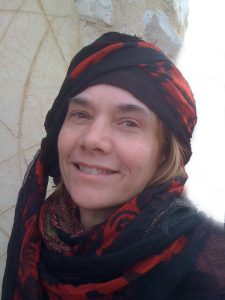 With International presenter – Amber Gray
With International presenter – Amber Gray
June 2016
This workshop provided theoretical, scientific, and contemplative rationale for the use of movement as measure of protection, self-care, and increased resilience, as well as an emergent best practice approach for therapeutic work with survivors of trauma. It covered breath, movement, rhythm and dance based practices that promote resilience and that can be used in therapeutic work with survivor clients of all ages.
Amber Gray is a licensed mental health professional, an award winning dance movement therapist, who is trained in Somatic Psychology, Contemplative Psychology, Somatic Experiencing, EMDR, parent child psychotherapy (an attachment model), trauma focused CBT, Historic Trauma, cranial sacral therapy, deep tissue bodywork, energy medicine, shiatsu, ecopsychology, and authentic movement.
Event details: Amber Gray June 2016
The Fourth Australian Dance Movement Therapy Conference
The Dance Movement Therapy Association of Australia turned 21 in 2015.
To celebrate, the DTAA and the Hanny Exiner Memorial Foundation presented this exciting event:
National Conference: Broadening the Spectrum:
Dance and other expressive arts therapies for health and healing
July 10-12, 2015
The Historic Abbotsford Convent, Abbotsford, Victoria
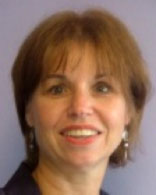 The conference explored how dance movement therapy and other creative arts therapies function as single and multi-modal approaches to health and healing; and how dance movement therapists make valued contributions to multi-disciplinary teams.
The conference explored how dance movement therapy and other creative arts therapies function as single and multi-modal approaches to health and healing; and how dance movement therapists make valued contributions to multi-disciplinary teams.
CONFERENCE THEMES
- How can the healing potential of dance movement therapy be strengthened through connection with other creative arts modalities?
- How can dance movement therapists work in partnership to promote client outcomes, especially in areas of trauma and attachment?
- How can we strengthen the use of evidence in approaches to dance movement therapy?
- What is the relationship between dance movement therapy and our indigenous cultures?
CONFERENCE STREAMS
- Skill development in dance movement therapy
- Therapeutic applications of dance for specific populations and communities
- Professional issues and supervision
- Research and evaluation
We were honoured to have Dr. Sherry Goodill, Chairperson of the Department of Creative Arts Therapies at Drexel University, USA, and President of the American Dance Therapy Association, confirmed as our first keynote speaker.
Pre and post conference workshops with local and international presenters were offered.
DTAA Supervision Session
Sunday June 5th, 2016
Spiral Dance – Continuum Movement Playshop
November 27, 28, 29, 2015
Our strength is our fluidity. As water undulates, spirals, and flows, so do we. This playshop combines the healing soundstreams and movements of Continuum with the dynamic play of Emilie Conrad’s Jungle Gym Fitness. We will invigorate our fluid systems and creatively explore our relationship to gravity through waves, spirals and involutions. Dancing with gravity, we increase our adaptability, flexibility and resilience. Fluid, dynamic strength allows for greater ease and range of movement without the inherent detrimental effects of traditional strength models. Our movement explorations will dance the continuum from slow flow and ease to energizing, dynamic and strengthening. This playshop is appropriate for all therapeutic, movement and bodywork practitioners, and for all bodies and fitness levels.
Run by Amber Gray – an authorised Continuum Movement Teacher and
award winning dance movement therapist.
Amber has worked for many years with people who have survived violation, human rights abuses, and terror. Amber uses Continuum movement as a primary restorative practice in her work, and for resilience after injury, illness and chronic stress. Her teaching often combines Continuum with dance movement therapy, somatic psychology, current trauma and neuropsychological research, movement therapy, life impressions bodywork, ritual, and creative arts.
More information
Restoring Core Rhythmicity: The Art of Play and Social Engagement for Trauma
December 4th, 5th and 6th, 2015
Exposure to traumatic events literally and metaphorically “freezes” our bodies, minds and spirits in a “lock-down” of past memories. Current neuro-psychiatric research has shown that when someone is traumatized, a majority of traumatic memory is implicit— or sensory-motoric and image-based. Many of the researchers endorse the use of non-verbal therapies for survivors to fully integrate the past with the present and restore well-being and balance.
This training will support clinicians, dance movement therapists, art therapists, and somatic therapists to work with survivors of trauma (in particular, relational trauma, complex trauma, and trauma secondary to violence) using a variety of very practical, body, movement, and dance-based approaches. It will benefit all mental health professionals who work with survivors of trauma and wish to integrate body-based and creative arts approaches into their work in individual and group contexts.
The pathways include neurobiological research such as Stephen Porge’s Polyvagal Theory, Dance/Movement Therapy, Somatic Psychology, Continuum Movement, and Embodied Developmental Psychology. This workshop will integrate a framework for working with rhythmicity co-collaborated by the facilitator with Dr Porges.
Run by Amber Gray – award winning dance movement therapist.
Amber is a licensed mental health professional specialized in working with survivors of trauma. She is an award winning dance movement therapist, who is trained in Somatic Psychology, Somatic Experiencing, EMDR, Trauma Focused Cognitive Behavioral Therapy, Historic Trauma, and Authentic Movement. She is also an Authorized Continuum Movement teacher and an advocate of human rights.
More information
Spiral Dance – Continuum Movement Playshop
with Amber Gray
November 27 – 29, 2015
More information
Restoring Core Rhythmicity
with Amber Gray
December 4 – 6, 2015
More information
The Dance of Connection in Dementia Care: Getting to the Heart of the Matter
Donna Newman Bluestein from the US
Saturday February 21, 2015
Collingwood Senior Citizen’s Centre
‘Dancing with Older Adults and People with Dementia’ in the morning
‘The Dance of Interaction: Embodied Relationships in Dementia Care’ in the afternoon
The morning workshop provides a model for a dance/expressive movement program that is fun, engaging and esteem-building; while in the afternoon ‘The Dance of Interaction: Embodied Relationships in Dementia Care’, will focus on Quality of life (QoL) indicators that are relevant to this population.
Download Flyer
The Therapeutic Use of Movement and Dance in Dementia Care
1 November 2014, Sydney NSW
Morning workshop – Introduction & Dance Experience
How does dance fit into person-centred care in dementia programming?
Heather will introduce person-centred care, lead a dance experience and show you different ways to develop simple material, while also identifying the important aspects of a dance and movement session.
Afternoon Workshop – Expand your Knowledge and Skills
Embody the experience of the person with dementia, identify key aspects and themes of the work, ideas for music and props, look at the challenges that present in various settings and with different groups, e.g. people in the latter stages of dementia, and understand what happens when dance meets person-centred care.
The presenter
Heather Hill, PhD, M.Ed, B.A., Grad.Dip. Movement and Dance, Grad.Cert. Dance Therapy, Professional Member of the Dance Movement Therapy Association of Australia is a consultant in dementia and aged care and a dance movement therapist. She has worked for almost 30 years in the field of dementia, and lectured in dance therapy, creative arts therapy and arts-based inquiry. Heather has written journal articles, book chapters and two books for caregivers on dance for people with dementia: “Invitation to the Dance” (Stirling University, 2001, 2009) and “Let me stay and dance with you” published in Japanese (Creates Kamogawa, 2014).
Professional Practice and Supervision Day
Sunday 22nd June 2014
Experiential supervision for DTAA members.
Download flyer: Professional Practice and Supervision Day
PACFA Conference
(Psychotherapy and Counselling Association of Australia)
13 & 15 June, 2014
Complexity & Connectedness in Life and Love
Working with trauma, mental health & identity
Aerial UTS Function Centre, University of Technology, Sydney
Keynote speaker: Professor Emeritus of Counselling and John Macleod, University of Abertay, Scotland.
The conference will explore how counsellors and psychotherapists support clients with the complex challenges of life and relationships in the 21st century.
www.pacfa.org.au
Penelope Best
PENELOPE BEST – in Australia 2014
Becoming Human: How do we embody cultural, familial and engendered experiences in our ever-changing bodies as practitioners?
Three linked workshops: Friday 14, Saturday 15 and Sunday 16 February, 2014
The Convent, Dorm 1, Rosina Building – 1 St Helier Street Abbotsford, Melbourne. http://www.trybooking.com/69867
Please see attached flyer
CPF training series
Amber Gray; Body as Voice Part three Somatic and Creative Arts Approaches to Working with Survivors of Trauma.
Saturday 22 – 25 February, 2014
The Convent, Dorm 1, Rosina Building – 1 St Helier Street Abbotsford, Melbourne. http://www.trybooking.com/69877
Please see attached flyer
Radical Freedom – a continuum movement intensive
Continuum, Trauma and the Restorative Process with Amber Gray.
Wednesday 26 – March 2, 2014
The Convent, Dorm 1, Rosina Building – 1 St Helier Street Abbotsford, Melbourne.
Bookings: http://www.trybooking.com/69872
Body as Voice – Amber Gray
Catch-up sessions for Part One of the Trauma Training
(introduction to the application of somatic psychology and creative arts therapies with survivors of severe trauma)
Wednesday 9 Oct 2-7pm & Thursday 10 Oct 10am – 6pm
At the Abbotsford Convent, in Dorm 2, Rosina Building –
1 St Helier Street Abbotsford, Melbourne.
Body as Voice: Restorative Movement Psychotherapy, Trauma and Resiliency Training Series
With International presenter – Amber Gray
October – Saturday 12, Sunday 13, Monday 14, Tuesday 15
The Convent, Dorm 1, Rosina Building
1 St Helier Street Abbotsford, Melbourne
Body Wisdom: Somatic and Creative Arts Approaches to Working with Survivors of Trauma
This training series will prepare clinicians, dance movement therapists, art therapists, and somatic therapists to work with survivors of trauma and strongly emphasizes mitigation of secondary trauma through practitioner self-care.
Download Flyer
Sara Boas one-day experiential workshops
featuring Josselin Butté’s live music and percussion.
September 14 & 15, 2013
University of Technology Sydney (UTS) Kuring-gai Sports Centre, Eton Rd, Lindfield, Sydney, NSW 2070
Workshop 1 – Saturday September 14
Co-Creating the Healing Space: integrating movement, music and words in therapy
Workshop 2 – Sunday September 15
Structuring the Unknown: deepening and adapting your group work skills for diverse client populations
Download Flyer
DTAA event
Reflective Practice – Supervision Day
For those needing the opportunity to build up supervision hours and be involved in a sharing with your peers
Sunday June 16
At: Abbotsford Convent Melbourne Dorm 2, Rosina Building
1, St Heliers Street, Abbotsford, Melbourne.
Download flyer
Body as Voice: Restorative Movement Psychotherapy. Trauma and Resiliency Training Series with International presenter – Amber Gray
Four day workshop 9.30 – 5 pm daily.
Saturday 29 and Sunday 30 June. Monday 1 and Tuesday 2 July 2013
Body Mind/Beginners Mind
Introduces participants to the application of somatic psychology and creative arts therapies with survivors of severe trauma, such as mass trauma (natural and human-made disasters) and extreme interpersonal violence. A sampling of the literature on somatic and creative approaches to working with this population is included with emphasis on cross culturally congruent resource and strength oriented approaches to both practitioners own somatic awareness, and clinical practice. The emphasis of Part 1 is on establishing relative safety and stability; cultivating, somatic awareness, and the primary portals to the body for embodied self awareness and care. This is a dynamic, hands-on, practically applied format with a need to dress comfortably and be ready to move.
Download flyer
Creative Arts Therapy Forum
Saturday 6 July 2013, 9am-5pm.
The Community Rooms, Abbotsford Convent Melbourne.
Birds of a Feather (BOAF), ‘Taking Flight’
One day Symposium with presentations from associations ANZATA, DTAA, ACATA and AMTA, group work and participation. Saturday 6 July 2013, 9am-5pm. The Community Rooms, Abbotsford Convent, 1 Saint Heliers st, Abbotsford. Bookings essential. Further enquiries contact Jane Guthrie jguthrie@alphalink.com.au.
Download flyer
Penelope Best back in Melbourne
Professional development workshops on 8, 9 & 10 February, 2013
Therapist as audience, witness, and player;
How might the Fool, the Mover, and the Supervisor help the therapist to ‘see’ more clearly in the murky inter-subjective space?
Dorm 1, Rosina building, Abbotsford Convent, Melbourne
Embodied Chakras as Tools for DMT
Egyptian Dance expressed through the patterns of Chakras with Maria Sangiorgi
Sunday March 3, 2013. 9.30 am registration for workshop 10 am – 5.00 pm
Dorm 1, Rosina Building, First Floor, Abbotsford Convent.
The Chakras provide practical tools for the creation of strong physical and emotional connections. Combined with the spiritual blue print of the Chakras they provide a vehicle for healing. Egyptian dance expresses through spirals, waves, circles and strong connections to the earth – the patterns of the Chakras. Physical, emotional and spiritual change has been witnessed as a result of combining Egyptian dance to the physical expression and grounding they offer. Change has also been witnessed when they have been used within a DMT framework when working with various populations over the years. The workshop is aimed to provide the Dance Movement Therapist with some practical tools they can include in their DMT framework.
Maria Sangiorgi is a Dance Movement Therapist and creator of Embodied Bellydance®.
During her 23 year of teaching Bellydance and research into somatic movement practices she developed Embodied Bellydance®. She uses aspects of this in her therapeutic practice.
As a Dance Movement Therapist, Maria works with the physically and intellectually handicapped and homeless woman with mental health issues. She also facilitates Dance Journeys for the Awakening Heart, including SensingFeelingDancing the Chakras, and Women Dance Retreats. She mixes media artist practices and Esoteric Healing. Maria is also a massage therapist and is currently living in Italy.
Download Flyer
DTAA Professional Development Event & Annual General Meeting
10 November 2012
Dance Movement and Other Creative Arts Therapies
Presentations by Elizabeth Mackenzie and Sharon Paetzold
Abbotsford Convent, Melbourne
Download flyer
Lifestreams: Continuum as Healing Movement, with Amber Gray
7, 8 & 9 September, 2012,
Abbotsford Convent Melbourne
Continuum is moving medicine. Emilie Conrad, creator of Continuum Movement, teaches that all fluids are basically one element, resonating with all other fluids. They function as a kind of umbilical cord supplying us with the pulsing undulations of life. Amber Gray, an authorized Continuum Movement Teacher and award winning dance movement therapist, who has worked for many years with people whom have survived violation, human rights abuses, and terror. Amber is using Continuum movement as a primary restorative practice in her work, and for resilience after injury, illness and chronic stress. Her teaching often combines Continuum with dance movement therapy, somatic psychology, current trauma and neuropsychological research, movement therapy, life impressions bodywork, ritual, and creative arts. This workshop is open to movement artists and practitioners, therapists, bodyworkers and all those committed to a deep exploration of how life reveals itself in each and every breath and movement we create. This workshop is an invitation to dive into the pool of existence within our cells and enter the play of life through Continuum, a practice that involves simple sound streams (to stir the fluid that resides within our tissues), breathing patterns, and slow, organic movements. In this workshop, we will have opportunities to address specific participant or client issues as defined by the group. The workshop will be organised so that attendees can participate in the weekend, even if they simply cannot attend on Friday evening, however,the experience offered will be much richer for those who can start at the beginning.
More information: Download flyer
Professional Membership Preparation and Reflective Practice Day
23 June, 2012, Abbotsford Convent, Melbourne
This strategic initiative from the Association was aimed at encouraging eligible members to become Professional Members, to increase the professional Membership number, to benefit the profession and provide successful candidates with increased professional standing. The morning session provided reflective practice supervision opportunities for all members and continuing education hours for those who need them.
Download flyer
Four day professional development intensive
29 June – 2 July 2012, Darwin
Introduction to Dance Movement Therapy: Download flyer
Working with dance for people with a disability: Download flyer
Presenters: Kim Dunphy and Alex Jordan, from the DTAA in partnership with Darwin Community Arts and Ausdance N.T.
Birds of a Feather… Flocking Together
Creative Arts Therapies Celebration
Saturday 14 July 2012, The Dax Centre Gallery and Foyer, Melbourne
The celebration was the final event in a two day summit seeking to explore potential collaborations across creative arts therapy disciplines across the Asia-Pacific. The DTAA invited a selected group of participants to attend as representatives of dance-movement therapy.
Event presenters: ANZATA, ACATA, AMTA, DTAA. Event supporters: La Trobe University, MIECAT, Phoenix Institute of Australia
For more info: www.anzata.org | Download flyer
Expressive Therapy Approaches to Working with Trauma
Vivien Marcow Speiser, PhD, LMHC, ADTR and Philip Speiser, PhD, RDT
Sunday 4 March 2012
Vivien is Professor and Director of National, International and Collaborative Programs at Lesley University in the USA, a dance therapist and expressive arts educator, and Phillip is Director of Arts Therapy at Whittier Street Health Center, Roxbury MA, an expressive arts educator/therapist, drama and music therapist who has developed and implemented integrated arts therapy programs for two decades.
Participants in the workshop explored body based approaches to working with trauma; arts based interventions and experiential activities for working with specific populations.
Balancing Differentiation and Linkage: A well-being frame for clients and therapists
Hosted by the DTAA with the Hanny Exiner Memorial Foundation (HEMF)
Friday 3, Saturday 4 and Sunday 5 February, 2012
Abbotsford Convent, Melbourne
Workshops: The thinking skin: The porous nature of ethics in dance therapy
Building materials of relationship: Swim alongside, interrupt, flirt
Bodies in therapeutic and supervisory spaces: Subtle seduction
Presenter: Penelope Best’s extensive practice as a senior dance movement psychotherapist, clinical supervisor, international trainer and researcher supports her continued curiosity about the importance of the body within relationship. As President of the European Network for Dance Therapy (2007-2010) she is keenly aware of different views about core elements of therapeutic practice and training. With Dr Beatrice Allegranti, she has recently co-created the first UK accredited DMP supervision training. She is fascinated by the influence of cultural differences and has initiated and runs professional DMP trainings in Warsaw, Poland, Croatia and the Netherlands. She is an Honorary Fellow of ADMP UK, External Examiner for Derby University DMP Masters, Fellow of Higher Education Academy, consultant to the profession, and maintains both private therapy and supervisory practices while publishing regularly. She enjoys facilitating opportunities for learning, using mixed creative materials and critical reflexivity. . Her main area for research is the relational spaces within clinical supervision. Penelope is well known to us in Australia (as Penny) from several visits between 2000 and 2006 to provide professional development and supervision for Australian dance-movement therapists.
More information
DTAA Professional Development Weekend and Annual General Meeting
November 5 and 6, 2011, Edinburgh Gardens Community Centre, North Fitzroy
Workshop with Jilba Wallace: ‘Sensori-motor psychotherapy, neuroscience and implications for dmt’, MA LPC BC-DMT CHt
Sensorimotor Processing is a therapeutic modality created by Pat Ogden, PhD, who founded the Sensorimotor Psychotherapy Institute in Boulder, Colorado. There are many overlaps with dance movement therapy techniques such as those in the Moving Cycle (Christine Caldwell PhD) which help clients become aware of body sensations, movement inclinations and how these manifest into insightful, healing metaphors that can inform choices to change. This model works with resolving trauma patterns through tracking “procedural memory”, using mindfulness of body sensations, implicit memory and physical action. There is now a large body of neuroscience research to confirm the relevance of this technique and movement therapy for regulating emotions. Jilba will present some neuroscience theory and her experiences in working with sensorimotor and dance movement therapy in her private practice with individuals.
Presenter: Jilba Wallace, from Colorado, USA, graduated from Naropa University (Colorado) in 1992 and continues to teach and to mentor there. She grew up in Australia and worked in the outback for seven years using drama and dance with aboriginal children. She has a private practice in a semi-rural area, and works part time in a psychiatric hospital running an intensive outpatient program, with a multi-disciplinary team in the USA. Her interests include liturgical dance, yoga, mindfulness practice and shamanic principles.
Workshops with dmt practitioners Natalie Poole and Anna Ganz, and Annual General Meeting, 12.30-2 pm over lunch
Morning: ‘Music for dance movement therapy’ led by Natalie Poole
Afternoon: ‘Finding the dance in dance movement therapy’ led by Anna Ganz.
More information
Workshop with international presenter Amber Gray
Deep Roots: An Immersion in Continuum Movement
Abbotsford Convent, August, 2011
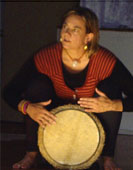 Continuum movement as based on the work pioneered by Emilie Conrad, increases flexibility, motility, well-being, creativity, innovation, adaptability and vitality on many levels. Because it does not rely on fixed patterns or postures, it enables us to access our capacity for fluid, free, non-constrained movement, which enhances a sense of youthfulness, aliveness and well being. It is a particularly valuable resource to use in the restorative movement process after trauma and for resilience after injury, illness and chronic stress.
Continuum movement as based on the work pioneered by Emilie Conrad, increases flexibility, motility, well-being, creativity, innovation, adaptability and vitality on many levels. Because it does not rely on fixed patterns or postures, it enables us to access our capacity for fluid, free, non-constrained movement, which enhances a sense of youthfulness, aliveness and well being. It is a particularly valuable resource to use in the restorative movement process after trauma and for resilience after injury, illness and chronic stress.
Amber Gray is using Continuum Movement more and more in her own work, and usually combines it into her innovative approaches to stress and trauma recovery. She combines it with somatic psychology, current trauma and neuropsychological research, movement therapy, ritual, and creative arts, in the trainings she provides for health and mental health professionals and paraprofessionals worldwide. In this workshop she will focus on Continuum Movement Practice as a means of teaching us to reduce physical limitations through movement innovation, to counter the “densifying” process of aging and stress, and increase both perceptual and mental awareness.
Continuum was explored in this workshop as a powerful form of movement that can access individual and collective bio-intelligence, or body wisdom. It borrows from the authentic movement principle of witness to develop the abilities to use this conscious movement practice to discover, uncover and express deep inner experience as root to thoughts, feelings, actions and stories. This course on continuum was a rich landscape of sound, breath and movement exploration to increase the awareness of the wellsprings of creativity, flexibility and joy that exists in the body and provide an opportunity to ground us into the experience of corporal presence. Continuum Movement experiences can provide the opportunity for growth and wellness for both the practitioner and their clients.
Presenter: Amber Gray is a longtime practitioner of body centered arts and sciences (somatic psychology, massage therapy, Life Impressions Body-work, Dance movement therapy, energy medicine, cranio-sacral therapy, yoga, and shiatsu), and an advocate of human rights. She is an authorized Continuum teacher, and a licensed mental health professional, who has worked internationally and nationally as an activist, an artist, a mental health professional, a program director and a trainer/consultant on behalf of victims of human rights abuses such as torture, war, and organized violence, for over twenty years. She is currently Director of Restorative Resources Consulting and Training. Her work has taken her to Indonesia, Kosova, Rwanda, Central America, Mexico, New Zealand, Croatia, Norway, Sweden, India, Sudan/Darfur, Lebanon, West Bank, Chad and of course her favorite country—Australia!
Download flyer for more information
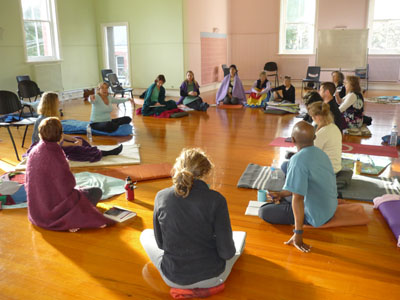
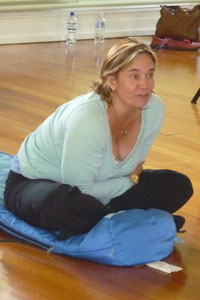
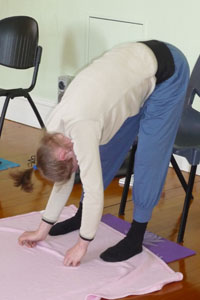
Professional Development and Supervision Weekend – 18 and 19 June
Saturday June 18, 2011 Lucy Guerin Studio, 14 Batman St, West Melbourne / More info
Freedom to Move: movement and dance with people who have intellectual disabilities
Kim Dunphy and Sue Mullane
Morning: Experiential workshop – practice and principles of dance-movement
Afternoon: Practical workshop – Introducing a framework for assessment
Morning: focus on the practice and principles of dance and movement with people who have intellectual disabilities.
Topics covered included:
- the value of dance for people with intellectual disabilities
- taking a Laban-based approach
- working with children, working with adults
- maximising the potential of low functioning clients
- strategies for successful group leadership
- extending the dance medium: props, music, dance styles, arts forms
Afternoon: Introducing a framework of assessment for dance and dance movement therapy programs, especially for people with intellectual disabilities. This workshop introduced a framework of assessment for dance-movement programs for people with special needs and intellectual disabilities. Theory was complemented by practice: participants used the framework to analyse video material of clients’ participation in a dance movement therapy program. This was followed by discussion on topics including:
- introducing dmt principles and the assessment framework to senior staff and school (or other organization) management
- harmonizing dmt assessment with other assessment frameworks, especially those in schools
- engaging non-specialist staff in the assessment process
- reporting to parents, especially those from different cultural backgrounds.
Saturday Flyer and registration form available here
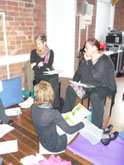
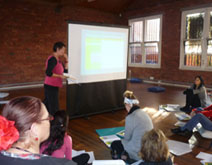
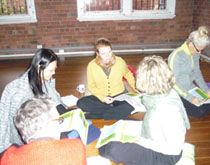
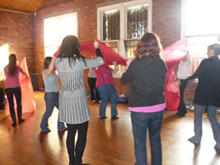
Professional Development and Supervision Day
Saturday April 30, 2011, Dancehouse, Melbourne
Supervision workshop: ‘What is happening in the therapeutic space?’ led by Anna Ganz and Jane Guthrie
The essence of the workshop was the provision of self-reflective practice in the relationship between the therapist and clients. There was an emphasis on transference and counter transference and /or ‘mutual influences’. The importance of critical self-reflection and creative development of the therapist was emphasised, and looking at the therapist forming a part of a team approach. Movement preferences, ways of interacting with others, and identifying personal values and belief systems were explored, and the importance of respecting differences. The workshop provided attendees with five hours of professional development and / or supervision.
Mentoring session: Becoming a DTAA Professional Member
Led by Anna Ganz, Fran Ostroburski and Bouthaina Mayall,
Professional Membership Committee, Dance Movement Therapy Association
Download flyer and registration form
Pathways to Restoration on the Stress Trauma Continuum
Melbourne, November 2010
Three day workshops with Amber Gray, dmt from USA
Presented by the DTAA and Hanny Exiner Memorial Foundation
Download flyer
Inside the Spoken Word: The body’s Role in Telling, Re-telling and Remaking our Lives
Sydney, October 2010
Three day workshops with Amber Gray, dmt from USA
Presented by the DTAA and Australian Somatic Integration Association
STARTTS Training Centre, Carramar, NSW
Download flyer
DTAA Professional Development and Supervision Day
Melbourne, June 2010
through Movement Experiential Learning
‘Ways of seeing’ led by Fran Ostroburski
This model of supervision is about refining attunement and listening to the space between. It is not about self or other but about ’Ways of seeing’ from a beyond the personal perspective, that provides the ability to move into any group. It is about the etheric field.
‘Relational creative processes’ led by Jane Guthrie
Focuses more on self and other and encourages positional shifts, to allow for problems or issues to be seen from different perspectives. It involves relational shaping. The hours on this day can be counted as supervision, or alternatively professional development if supervision hours are not needed.
Professional Development workshop
Sydney, March 2010
with Kim Dunphy, dance-movement therapist, performing arts educator and community artist.
Freedom to Move: Movement and Dance With People Who Have Disabilities
Download workshop notes
and
Assessment and Evaluation in Dance Therapy
Download workshop notes
Annual Professional Development Event,
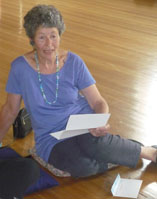
Naomi Aitchison makes HEMF
report to DTAA’s Annual
General Meeting, Nov. 2009
November 2009
Workshops:
A 3-D Perspective in Dance-Movement Therapy: define, deconstruct and dance
Presented by Michelle Royal
This workshop provided an opportunity to DEFINE personal issues in professional settings; to DECONSTRUCT the physical, emotional; and kinesthetic elements of these issues; and to heal and restore our professional relationships through DANCE.
Michelle Royal has degrees in the fields of Education,Movement Studies and the Arts, and a Diploma in Dance Movement Therapy (IDTIA). She draws on her training and skills in these modalities to develop and deliver specific programs for targeted groups in a variety of settings (community, educational, artistic and clinical).
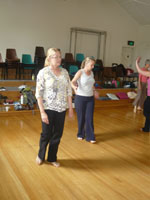
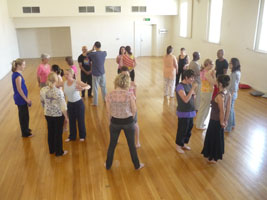
When There is More Than One: some considerations for managing group dance therapy
Presented by Sue Mullane – Dance Therapist, Sunshine Special Developmental School, Victoria
This afternoon workshop explored one model for facilitating group dance therapy processes based on some theoretical considerations.
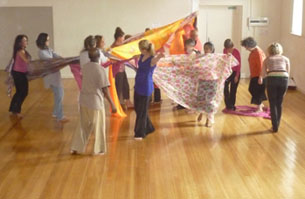
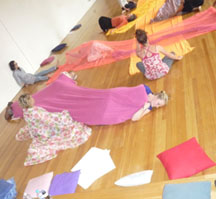
Sue, DMT, M.Ed. Melbourne Uni., Grad Dip Movt. and Dance, has worked in movement and dance in a wide variety of educational and health settings for more than 20 years. She worked collaboratively with staff from the South Eastern Centre Against Sexual Assault (SECASA), Victoria, co-devising and co-facilitating group programs incorporating creative arts and dance therapy for women survivors of sexual assault. She now works full-time as a DMT at Sunshine Special Developmental School.
Followed by dinner and celebration to launch our newest publication ‘Dance Therapy Collections 3’
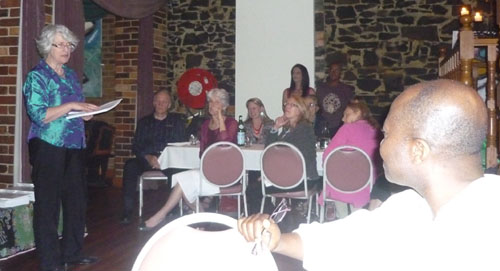
Professor Margot Schofield- Guest speaker at book launch and 15th birthday dinner
Workshops led by UK DMT Sara Boas
November 2009
LIFEdance! – Live your dance, Dance your life
Transcultural Competence – Exploring the Body of Culture
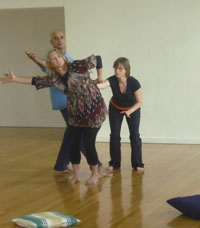
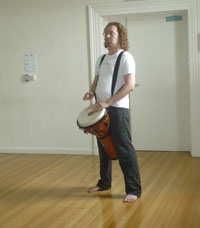
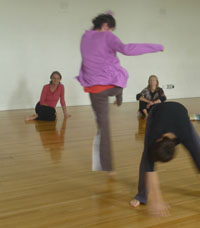
Professional Development Day
June, 2009
Reflecting on what we do: Inquiring into practice
Professional supervision led by Dr. Heather Hill
An important aspect of professional practice, particularly in the area of therapy, is the expectation that practitioners will ongoingly reflect on, scrutinise and inquire into their practice, and this is usually formalised within a context of professional supervision. There are many different ways to carry out this reflective/inquiry process and this workshop offers one approach. Starting from a “moment” of experience, participants were invited to inquire into this experience through a variety of modalities – movement, art, words, etc.- and through engaging with other participants (via partner and small group work) to further their inquiry. *Time taken for this process of inquiry will count as supervision hours.
The latter part of the day brought us back to what is at the heart of our practice, namely our connection with body. Jane Guthrie led a movement exploration that focussed on body connections from a developmental perspective as a foundation for all movement – to facilitate ease and efficiency – whether it be for expressive or functional purposes: focus on awareness of inner connections, how movement rides on the flow of breath, core distal connectivity and body integration.
Bridging the World of the Magical and the Medical with Jilba Wallace
November 2008
Jilba uses therapy models that include a synthesis of the Moving Cycle, Mindfulness of the body and Emotion Regulation as practiced in the Dialectical Behavior Therapy model, Authentic Movement, trance or hypnosis states and active visualization. She says that:
“Dance/movement therapists access their own world of the body, movement and creativity and can work with focused intent to make changes. The challenge in the professional setting is how to help clients/patients access their own resources (primarily the moving body) and integrate this, as well as explaining to peers in clinical settings how DMT can benefit the populations with which they work”.
In this experiential workshop she applied this synthesis to working with groups or individuals with chronic pain, chronic suicidal ideation, developmental disabilities and physical handicaps
Jilba Wallace MA, LPC, ADTR, lives in Colorado USA where she moved after growing up in Australia. Funded for her choreography in the community, she worked in the outback for seven years using drama and dance with aboriginal children. She graduated from Naropa University (Colorado) in 1992 and continues to teach and mentor there. She is Secretary of the ADTA’s Rocky Mountain Chapter, has a private practice, and works part time in a psychiatric hospital running an intensive outpatient program with a multidisciplinary team. Her own interests include liturgical dance, yoga, mindfulness practice and studying shamanic principles.
Workshop: Laban/Bartenieff Movement Analysis in DMT
November 2008
with Peggy Hackney
In this two day workshop Peggy explored the wide ranging threads of the LMA/Bartenieff work that can be used in DMT. Some aspects addressed include psychological issues and some more physical ones – which of course interweave with the psychological.
Some of the threads of the Laban/Bartenieff work developed in this workshop included:
- Tracking changes of Body Connectivity, Energy (Effort), Shape, and Spatial usage of client¡¦s and students. Looking at the Effort “coloring,” that can combine with Body, Shape and Space in various ways that change the meaning.
- Being open to the non-knowing of what is coming next to allow true therapist ‘presence’. Creating a safe place for the client to listen to their own bodies and develop their own inner witness and value their own messages.
- Becoming more aware of “Shadow Movements”, which with the client¡¦s words (which may contradict the movement being done), and messages from the practitioner¡¦s body, together form “Embodied Attentiveness” (so called by Katya Bloom).
- Becoming aware of the differences in relationships with the same or contrasting Effort qualities in interacting Kinespheres and the use of this in developing empathy and/or clashing in the therapeutic relationship and why both are needed.
- Tracking the underlying patterns of Developmental Movement that support the person and building up a set of movement patterns that help to organize the body from a lower brain level.
- Importance of LMA basic themes such as Mobility and Stability and Exertion and Recuperation in a therapy situation
Peggy Hackney, BA. Psych., RMT, MFA, Certified Massage Therapist, began her Laban training in 1963, graduating from the first Effort/Shape Certificate Program in NYC, and working with Irmgard Bartenieff for nearly 15 years. She was a performer for many years, tenured to the Dance Faculty of the University of Washington for 11 years, taught extensively in the USA and in Europe and used Authentic Movement for 15 years. She is internationally recognized for her work in Laban Movement Analysis and the Bartenieff Fundamentals, helped found the Intensive Certification Programs in NYC, Seattle, Salt Lake, and Berlin. She has also worked extensively with Bonnie Bainbridge Cohen, the founder of Body Mind Centering. Currently she directs and teaches in the Berkeley California Weekend Format Laban/Bartenieff Certificate Program. She is Assistant Director of Moving On Center in Oakland, CA, where she teaches classes integrating Somatics and! Performance. Currently Peggy is working on Dynamics in Motion Capture Animation through NYU on a grant from the National Science Foundation. Her book Making Connections: Total Body Integration through Bartenieff Fundamentals, published by Routledge, 2003, is in its third printing
Workshop : Innovative Model for Dance Movement Therapy Across Cultures:
The Center Post Framework (CPF) & Restorative Movement Psychotherapy
September 2008
with Amber Gray
In this workshop, Amber combined theory with embodied exploration to introduce the CPF, an innovative model that is rooted in DMT and integrates somatic and creative arts modalities into the restorative process. The Model can be used in a in a wide range of therapy applications and, as well as for DMTs, it is very relevant for creative arts therapists and psychotherapists using movement. The framework specifically addresses and honors the complexities of working with movement, dance and the body across diverse cultures, and the long term impact trauma has on survivors’ life experience. Approaches and methods to facilitate restoration, and the importance of culture as both a resource and a paradigm to guide somatic and expressive arts interventions were highlighted. Participants were encouraged to integrate the strength-based CPF into their dance-movement therapy practice, at the same time as cultivating somatic self-awareness, and stability in their own bodies.
Amber Gray, MPH, MA, ADTR, NCC, LPCC, provides training and consultation nationally and internationally on the application of dance-movement therapy and somatic psychotherapy to work with interpersonal trauma and conflict situations. She has a wealth of experience in treatment of trauma and torture survivors and childrens traumatic stress problems, using kinesthetic and non-verbal approaches. Amber also specializes in areas such as rhythm based rituals in clinical practice. She is the present Director of Restorative Resources Consulting and Training, Refugee Mental Health Coordinator for the State of New Mexico, and The Raven Drum Foundation’s Trauma and Resiliency Program Director.
Professional Development For Dance Movement Therapists, Students, Graduates & those interested in dance-movement therapy or allied movement forms
June 2008
Wesley Institute, Sydney,
Drawing Through Movement – with Lisa Roberts
Contact Improvisation – with Cath Magill
Towards wholeness: A two hour experience of the philosophies and methods of dance therapy pioneer Trudi Schoop – with Robyn Price
Emotional factors and working from the Pilates Centre with Penny Latey
Rethinking, Revising and Reframing Bartenieff Fundamentals – with Sandra Lauffenburger
‘Weaving the Threads’: Third Australian Dance-Movement Therapy Conference
Melbourne, Australia
November 2007
presented by the DTAA and the Hanny Exiner Memorial Foundation
Conference themes:
- How can dance and dance-movement therapy contribute to well-being and personal growth?
- How can dance and dance-movement therapy be employed as tools for health and healing?
- How can dance and dance-movement therapy contribute to the development of communities?
Conference streams:
- Skill development in dance-movement therapy
- Experiential learning in dance-movement therapy
- Applications of dance-movement therapy for specific populations
- Professional issues and supervision
- Research and evaluation













